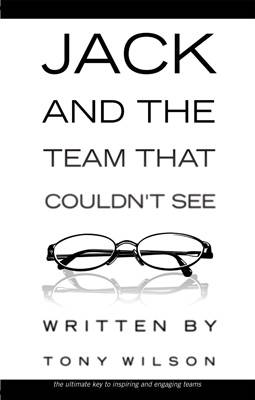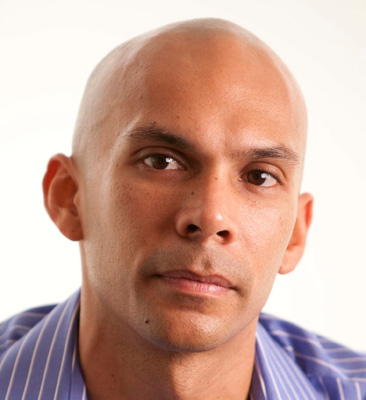Jack and the Team that Couldn't See

Jack and the Team that Couldn't See
Jack and the Team that Couldn't See is written for anyone in a leadership role who wants to inspire people to do their best.
The unique book is divided into two parts, each providing 'must know' lessons about leadership and managing teams for high performance. Part One tells the fictional story of Jack, a man who gets some unlikely leadership lessons from unlikely teachers.
"Although this part is written as a work of fiction, the lessons embedded in the story are essential for leaders who want to get the best out of their people. The story has characters that reflect the people I see in most teams and the problems that are prevalent in almost every workplace," said Tony.
Part Two condenses 25 years of Tony's research into performance management to provide a practical framework for building high performance teams that is unwittingly applied by Jack throughout the fictional story.
"It has more of a management focus and will help people connect the lessons in the story to their application in the office," said Tony.
Originally a performance coach for elite sporting teams and athletes throughout Australia and the USA, Tony Wilson now works closely with executive leaders in many of Australia's leading organisations to create a culture of high performance.
He has invested over 15 years to high performance management and is a sought after executive coach and Director of Teamcorp Australia.
According to Tony, Jack and the Team that Couldn't See was written especially for time-poor managers who need results, fast.
"I wanted to make the best use of my readers? time. It takes a couple of hours to read and is written in a style that will help dissolve the complexity and mystery that some people weave around building teams," said Wilson.
"While this book is definitely not an academic journal, the concepts have grounding in both management research and also the science of high performance," he said.
According to Tony, Jack and the Team that Couldn't See took decades to come to fruition.
"Throughout my career in sports and executive coaching I was exposed to some amazing coaches in Australia and the USA. Each one taught me something unforgettable about building great teams," he said.
"It took a long time to bring all of these lessons together and the result is the book," he said.
Tony Wilson is a performance consultant, coach, facilitator and corporate speaker. Tony certainly posses the knowledge and power to become one of Australia's most sought after speakers, with an already impressive client list featuring Ergon Energy, Brisbane Broncos and Macquarie Bank.
Tony has been labeled as the 'stress reliever'. Tony uses his knowledge from working with elite athletes to transcend on a corporate scale, applying the same work ethos of athletes to the commercial world.
One of his most successful programs, the Executive Athlete Program (EA), involves working with executive members of major corporations to apply the principles and discipline of elite athletes to the corporate sector in order to prevent burn out and maximise results in the current market
Jack and the Team that Couldn't See
www.tony-wilson.com.au
Price: $22.95

Interview with Tony Wilson
Question: Why do you believe that 90% of employees who resign are leaving because of poor managers, not their job?
Tony Wilson: There is research that has come out to support this and one the key things is that people want two main things from work; they want a really good environment to work in and the manager is directly responsible for that in vast majority of cases, if not all cases. If you know people that don't like where they're working then what you find is that you can ask them "would you take a pay cut of $5,000 or $10,000 to go and work somewhere that is really fantastic work?" and everyone of those people would say 'yes'.
People actually want to do well in their job and a lot of management theory is setup with the premise that people don't want to do well; they think you have to put all these things in place to make people do their job well. People actually want to achieve things and often, when they can't, it's a function of the environment their manager has created. People often feel like they're not getting anywhere with their work and I think that is contributing to the number of people that are working because of a bad boss.
I was speaking at a conference last week and someone had seen this information and they came to me and said "I can tell you now that the last three jobs I left, were all because of the boss."
Question: Can you talk about who you wrote Jack and the Team that Couldn't See for and why?
Tony Wilson: I work with managers and leadership teams a lot and the big thing I found about what people are disengaged and why people aren't as productive as they could be is because people can't really see what they are suppose to be doing, everyday and how they contribute to the bigger picture. Jack and the Team that Couldn't See really highlights the need for leaders to show people what is most important and why they turn up to work, everyday and why they're valuable.
I wrote the book for pretty much anyone that leads people, whether you are a first level manager or a CEO of a organising. You can apply a lot of the theory to how we lead people and how we get people engaged and committed to company and team goals.
Question: In Jack and the Team that Couldn't See you claim that most managers spend too much time on operations, systems, strategy, products and services; what negatives does this have?
Tony Wilson: One thing to understand is that all those things are important; you need good operations for economy, you need a good system to support what you want to do, you need a great strategy to implement. My point is that we spend a lot of time on this, we go to a lot of planning days, a lot of strategic planning sessions, we invest a lot of money teaching people about how things work and how to maximize them but we don't put a lot of effort then in how we translate those things into a great culture for our people to actually do them.
What you'll find is that if you look at the majority of research you'll see that if a company has a strategy that isn't perfect but you have people that really believe in it and really back it and go out there and execute it everyday then you'll be a lot more productive and successful; compared to a company that has a brilliant strategy that no one believes in. We put a lot of resources and education into teaching but actually engaging people and getting them to actually implement these things is a second thought and not as much goes into that.
Question: Can you explain your successful leadership factors; Clarity, Constant Improvement, Open and Honest Communication and Social Intelligence?
Tony Wilson: Clarity is the biggest one; the ultimate thing that separates great cultures and great teams from mediocre ones is the real clarity where people understand what they're trying to achieve and understand how they are suppose to behave. A business that has clarity has employees that understand what the culture is, what they are trying to achieve and what the rules of engagement are. Clarity is the absolute key and we undermine clarity in a whole lot of ways. Sometimes we just don't talk about it and sometimes our behaviour undermines what we are trying to achieve as leaders; sometimes there will be systems in place that don't really support what we are trying to achieve.
I recently worked with a company that had a goal that was to be outstanding in customer service and their customer service systems were terrible and the hierarchy nature of their organisation was difficult and people couldn't make decisions or it took three or four days to make decisions because it had to go through so many different sets of hands. This is a really good example of underminding clarity.
Constant Improvement is also really important because people like to achieve and improve. When we learn something new or we master a new skill we actually get all the feel-good hormones that you might get from other exciting things like bonuses and other rewards. We call these hormones the reward response and they actually help us perform. Apart from constant improvement just being a tool that keeps improving as an organisation keeps people engaged.
Without open and honest communication you can't have common goals and this is what I talk to management about. We already know from team building 101 that the essence of teams and why they perform well is that they have a common goal. If we don't create an environment where people can discuss goals and their opinions and debate about the best way to achieving them then people never really have ownership over them. If people don't receive ownership over them then they never really own those goals and those goals are never common and achieved.
Social Intelligence has become more and more important since the year of 2000 and it's just being able to connect with people and understand people's goals and aspirations. The era of people of turning up to work and working because that's what you're suppose to do is disappearing and people want to know that they are connecting with something bigger, they want to know that people actually care about them and whether they are engaged or not.
Interview by Brooke Hunter
MORE



